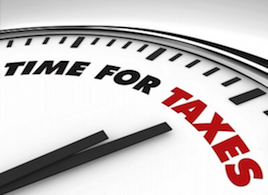You’ve either just completed your tax returns, or maybe you’re still working on them. Somehow, it seems like we’re always in one of those two camps during tax season (and perhaps afterward if we need to file an extension).
As a value investor, I’m frequently on the prowl searching to identify favorable stock valuations, but I’d like to take this opportunity to point out an overlooked personal finance tip, where you might be able to pinpoint the value of one important component from your recent tax returns filing. Frankly, after 20+ years in the finance industry, most personal finance advice tends to blur together – make your own coffee at home and take advantage of your 401k’s match – we get it. For whatever reason though, this equally simplistic tip is one I’ve never seen mentioned, anywhere.
First, a few given assumptions: 1) a majority of homeowners have a mortgage (I’ve seen numbers around 70%), 2) a large number of tax filers now submit electronically, and 3) there is a tremendous amount of dissention in the financial advice community with how to handle mortgage debt. Call-in to two different personal finance radio hosts to see if you should pay off your mortgage early and you’ll likely get 180° different answers, and very impassioned ones at that. Your own mortgage though is unique to your personal situation and not as easily mass-advised.
Here comes the value part. Go back to your electronically filed tax returns, and find the mortgage interest you deducted on Schedule A (if you file the paper route, this may be a bit more involved and involve a few more calculations). Change that number to zero and re-compute your taxes. By simply changing that input and comparing your net tax due (or refund), you’ll be able to get an instantaneous value of your mortgage interest tax deduction. Surprised by the result?
Have a large savings balance that you’ve considered pre-paying against your mortgage? Calculate how much less interest you would have paid for the preceding year and adjust accordingly. The electronic nature gives you the ability to tweak that interest number in order to ascertain what its value is to your personal bottom line. (Note to self: after the tweaking, return the numbers to their original state)
Obviously, there are numerous variables to consider with accelerating mortgage payments, trying to retire a mortgage balance, or if you should leave things as is and make the lowest payment amount possible. The number of years you’re planning on living at your current location, monthly cash flow, large expenses you may have outside of housing, and the expected rate of return on investable assets are just a few. However, quantifying the specific value of your mortgage’s deduction is a great start.
Instead of falling prey to conventional real estate and banking wisdom of “you don’t want to lose that deduction”, calculate and know its exact value, and also don’t forget that your mortgage balance is classified as an asset to the institution you write your monthly check to.
This may be an extremely simplistic tip, but knowing the value of your mortgage deduction may help you make other financial decisions. If it were me, I’d want to quantify the value of the mortgage tax deduction to my personal situation before I proceeded further.
Thanks for reading.
Heart Capital does not offer investment advice via this medium. Despite this article concerning mortgage tax deductions, under no circumstance whatsoever does this post represent tax advice. Consult your own personal advisor or tax expert. Nor should these postings, opinions, charts, or any other information represent a recommendation or personalized investment or financial planning advice.
Follow Ross on Twitter: @HeartCapital
Any opinions expressed herein are solely those of the author, and do not in any way represent the views or opinions of any other person or entity.








